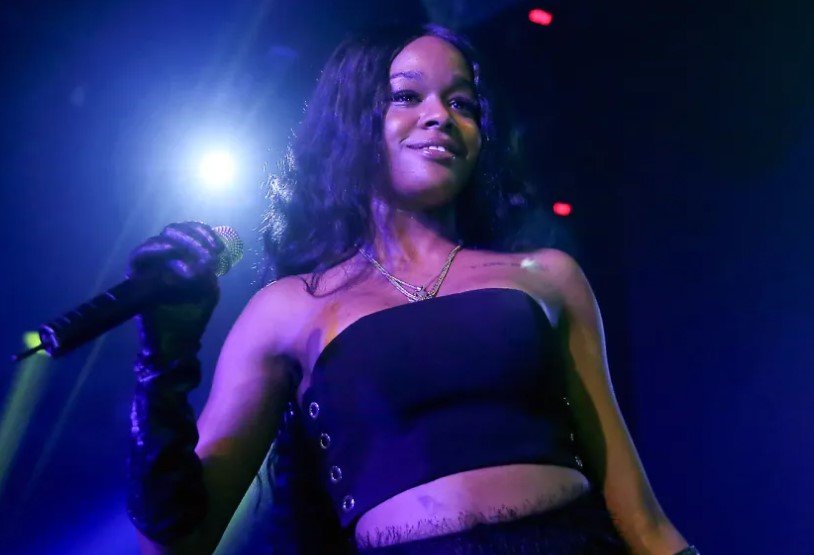The outspoken rapper Azealia Banks stirred the pot again with a series of fiery posts on X (formerly Twitter), boldly proclaiming her support for Israel and sparking backlash with her controversial views on the Israeli-Palestinian conflict.
Banks Breaks Silence: “I’m a Zionist, No Black Person Should Support Palestine”
Azealia Banks doesn’t do subtle, and her latest social media storm proves that once more. On Tuesday, the rapper bluntly declared, “I’m a Zionist,” answering a user’s question about where her loyalties lie in the long-running Middle East conflict.
But Banks didn’t stop at a simple statement of allegiance. Her posts dove deep into heated opinions about the conflict, Israel’s role, and the involvement—or lack thereof—of Arab countries. She argued that Arab nations had ample time to support Palestine but didn’t act, questioning why the United States or black Americans should bear responsibility.
This comment alone lit up the internet, igniting debates across social media platforms.
Banks also touched on controversial claims regarding the Middle East, including allegations about high inbreeding rates in the region. Such statements, though not backed by scientific consensus, intensified the firestorm.

Public Reaction and Social Media Backlash
The rapper’s bold stance quickly polarized fans and critics alike. Some applauded Banks for speaking her truth and shedding light on what she sees as overlooked issues, especially the plight of black people in the Islamic world. Others accused her of ignorance, insensitivity, and spreading harmful stereotypes.
Her comment about “chattel slavery” in the Islamic world drew particular scrutiny. Critics argued it oversimplified complex historical and geopolitical realities and unfairly targeted an entire religion and region.
Social media platforms like X exploded with debates, with hashtags for and against Banks trending for hours.
-
Many questioned her sudden focus on the Middle East, given her career in music and the arts.
-
Others debated whether her stance was rooted in genuine concern or shock-value provocation.
The Bigger Picture: Celebrity Voices in Global Conflicts
Banks isn’t the first celebrity to wade into the Israeli-Palestinian conflict—and certainly won’t be the last. The topic has been a lightning rod in pop culture for decades, often dividing fans and stirring controversy.
What makes Banks’ comments stand out, though, is the intersection of race, religion, and geopolitics. By urging black Americans to steer clear of supporting Palestine, she tapped into a sensitive and complex web of identity politics.
Her take reflects a broader debate among African American communities on foreign policy and solidarity, especially regarding conflicts where religion and race intersect.
Many artists and activists have spoken out in support of Palestine, viewing it through the lens of anti-colonialism and human rights. Banks challenges this narrative head-on, asking her followers to reconsider who is truly impacted and where loyalties should lie.
Examining Claims: Facts vs. Opinions
While Banks’ comments sparked conversation, it’s important to separate facts from opinion and hearsay.
For example, the claim about “high rates of inbreeding” in the Middle East lacks credible evidence and risks feeding negative stereotypes.
Similarly, the history of slavery—whether in Islamic or other contexts—is complex and rooted in centuries of varied practices that do not fit simple generalizations.
Understanding these nuances helps avoid oversimplifying or misrepresenting sensitive issues that affect millions.
| Topic | Common Misconceptions | Reality Check |
|---|---|---|
| Middle East inbreeding rates | Claimed to be high and widespread | No conclusive data supports widespread inbreeding |
| Slavery in Islamic world | Presented as ongoing “chattel” slavery | Historical slavery existed but differs vastly from transatlantic chattel slavery |
| Arab nations’ support for Palestine | Seen as absent or insufficient | Arab countries vary in support, complicated by geopolitics and internal challenges |
This table is a quick glance at some claims Banks made that warrant careful thought rather than outright acceptance.
What’s Next for Banks?
Whether this controversy will affect Azealia Banks’ career remains to be seen. She’s no stranger to public spats and media firestorms, often using bold statements to keep her name buzzing. Fans and critics alike expect more unpredictable commentary from her in the future.
One thing’s certain: Banks’ recent posts remind us how charged and complicated discussions about Israel, Palestine, and global racial issues can be, especially when they come from voices unafraid to break the mold.








